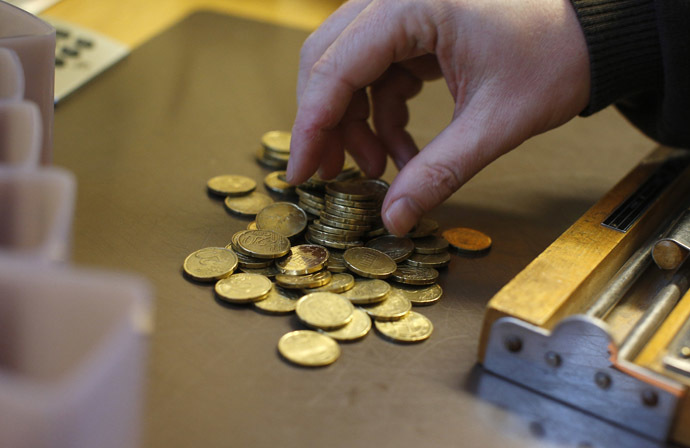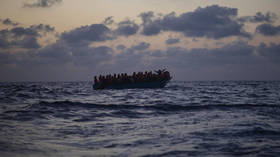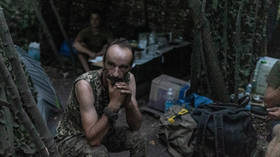Vicious circle: ‘Economy not growing as companies sit on billions and don’t invest‘
Corporations around the world have billions of dollars in their bank accounts and they don’t spend it because the economy is not growing, but the economy is not growing because they are not spending the money, stock market analyst David Kuo told RT.
The entire global economy might be standing on the brink of a new financial crisis. According to the IMF, this time the threat is from central banks which encourage people to invest in risky businesses.
RT:The 2008 financial crisis is still fresh in our minds. What's the problem with the global financial system now?
David Kuo: I think we have to go back to 2008 and find out exactly what happened. As far as the financial institutions were concerned, they were in the mess. So consequently, the central banks around the world said what we need to do is to try to recapitalize, in other words, make the banks and financial institutions a lot stronger. So they embarked on the thing of the quantitative easing that effectively means that they printed a lot of money and they pumped it into the global economy. The whole idea really was to try to make banks stronger. There were some unintended consequences as result of that because once the intention was good, in other words, to try to make financial institutions a bit stronger, the money went all over the place.
What we actually found was that bond prices were reaching sky-high levels, as the result of that the interest rates were very low. Money also went into property markets, went to the all kinds of assets. And as a result of that people were going around chasing higher yields, because if you left your money in a bank, you were getting nothing, you were getting zero, and in some cases you were getting less than zero because the banks were charging you for depositing money into particular institutions. So people were going around, flooding the global asset market with the cash that they had in their pockets, and this is what the IMF is warning now - many of these policies are now unsustainable.

RT:How dangerous is the situation right now?
DK: It depends on a number of things. First of all, all eyes were on the Federal Reserve to see what they would do with regards to interest rates. If they were to increase interest rates, then what will then happen is that bond prices - in other words, people who thought they were in a safe haven putting their money into bonds - the bond prices will then collapse and that people would then suffer what will be called “capital loss.” That was undesirable. That’s why many people were watching to see what Janet Yellen had to say, and what she said was that they had no intention of increasing the interest rates for the foreseeable future, or for some time yet, and she was looking at what was going on in the rest of the world. At the same time people are flooding into the US dollar because they thought it was a safe haven, and the US economy doesn’t really want that either because it’s pushing up the US dollar, which means that it makes it increasingly more difficult for America to export the goods that it has. So that’s not really desirable.
Then we have all these sorts of property prices. There was a report that came out that reckoned that property prices from places as far afield as Canada or Singapore, and from Hong Kong to the UK were about 25 percent overvalued. We can actually argue whether or not things are overvalued or undervalued, but according to this report, it’s overvalued, which means that there could be a correction in place. If that happened, everyone who borrowed money in order to buy these properties will then be hurt very badly.
RT:Who will be affected if a new crisis breaks out? What are the particular economies or markets that are vulnerable now?
DK: If you have a look at four asset classes, first of all, we have cash and that is deeply unattractive right now. Nobody really wants to put their money into cash. Then we have bonds, and bonds look very overpriced right now. Property - everybody that borrowed money heavily in order to buy property - that doesn’t look good either. And then we have this anomaly which seems that the global economy is not growing and yet the stock market just keeps on nudging higher and higher week after week, month after month. Then people are saying: “Where on the earth can I put my money now because it doesn’t seem to be anywhere where I can put my money”.
But if you have a look at the stock market, it is still, as far as I’m concerned, not overvalued right now because it seems to be the best place where you can get dividend yield. In other words, the companies pay out some of their profits to shareholders, so that doesn’t look too bad. On the other hand, as far as evaluations are concerned, it probably looks less overvalued than any of the other asset classes. So whilst taking on board what the IMF is warning about, I think corporations, companies around the world really need to start thinking very seriously about investing the cash that they have. They have got hundreds of billions of dollars of cash sitting in their bank accounts, and they don’t really want to spend the money because they say the economy is not growing. Well, the economy is not growing because they are not spending the money. What came first, the chicken or the egg?
The statements, views and opinions expressed in this column are solely those of the author and do not necessarily represent those of RT.
The statements, views and opinions expressed in this column are solely those of the author and do not necessarily represent those of RT.












